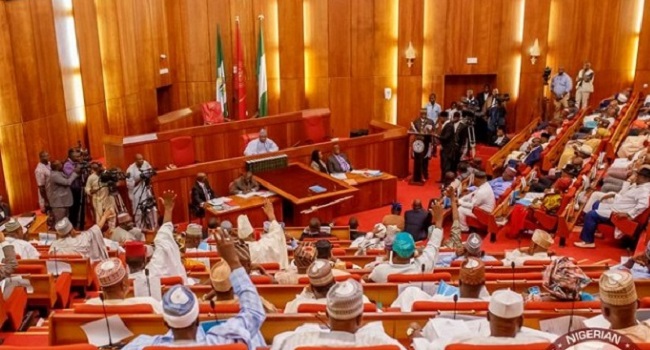News
Senator claims 50m Nigerians suffering from mental illness

The chairman, Senate Committee on Health, Senator Yahaya Oloriegbe, on Wednesday, said that about 50 million Nigerians suffer some form of mental illness.
He stated this while leading the debate on a “Bill for an Act to provide for the establishment and regulation of mental health and substance abuse services, protect persons with mental health needs and establishment of National Commission for mental and substance abuse services, for the effective management of mental health in Nigeria and for other related matters, 2019,” on the floor of the Senate.
The bill was sponsored by the senator himself and was read for the second time during the lawmakers’ plenary today.
He said, “According to the World Health Organization (WHO), about 50 million people are suffering from some sort of mental illness in Nigeria!”
This means that with a population of about 200 million people, one in every four persons are suffering from mental illness.
He went further to say that Nigeria, as the seventh-largest country in the world ranked highest in Africa and fifth in the world in the number of depressed people and the frequency of suicide.
He said, “There are less than 150 psychiatrists in this country of 200 million, and WHO estimates that fewer than 10 per cent of mentally ill Nigerians have access to the care they need.”
The senator also decried the absence of Mental Health Law in Nigeria other than the Regional Lunacy Law of 1958, which according to him, “in content and context violates fundamental human rights of persons with mental health and psychosocial disabilities.”
He said, “It is a law which lacks a focus on human rights and non-discrimination, access to services and least restrictive treatment alternatives.
“Its definitions are largely inadequate in terms of humanness and scope as it continues to employ denigrating terms such as ‘lunatic’, ‘idiot’ and ‘unsound’ mind while focusing almost entirely on custodial care and the wordings are derogatory and highly stigmatizing.
“There is an evident lack of public mental health promotion and mental illness prevention programs in Nigeria due to non-implementation of the National Mental Health Service Delivery Policy (2013), the current approach is only treatment directed.
“In addition to this, is the failure of the Government to regulate treatment practices, religious belief and misconceptions about mental health and psychosocial disabilities.
“This has led to an increase in proliferation of unorthodox treatment and detention centres such as traditional healing homes and religious/spiritual centres that take advantage of the vulnerable in our society.
“There have been reported cases of deprivation (food and water), physical, sexual and emotional assaults on persons with mental health and psychosocial disabilities.
“There is unprecedented level of myths and misconceptions which are further entrenched by ignorance, poverty and wrong beliefs system about mental health and psychosocial disability.
“These beliefs, myths and cultural practices contribute to human rights violations of persons with mental health and psychosocial disabilities.
“Parents and relatives give away their wards easily to some of these detention centres with the hope of getting help, succour and solution to mental health issues.
“The lack of strategies for mental well-being promotion and mental health and psychosocial disability prevention activities have led to overarching increase in the prevalence of mental health and psychosocial disabilities, increase in suicide (especially among the youths) and substance abuse disorders in Nigeria.”
READ ALSO: Bill on social media passes second reading at Senate
He lamented the lack of equitable distribution of the few modern structures of service delivery for persons with mental health and psychosocial disabilities in Nigeria.
“It is non-existent in the rural areas where the vast majority of Nigerians who need it reside.
“Countries such as South Africa, Egypt, and Kenya have more psychiatrists per 100,000 persons and also higher proportions of psychiatric beds.
“Many countries in Africa also give better official attention to mental health issues.
After the bill was supported by his colleagues, Senate President Ahmad Lawan referred it to the Senate Committee on Health for further legislative work.
Join the conversation
Support Ripples Nigeria, hold up solutions journalism
Balanced, fearless journalism driven by data comes at huge financial costs.
As a media platform, we hold leadership accountable and will not trade the right to press freedom and free speech for a piece of cake.
If you like what we do, and are ready to uphold solutions journalism, kindly donate to the Ripples Nigeria cause.
Your support would help to ensure that citizens and institutions continue to have free access to credible and reliable information for societal development.
























